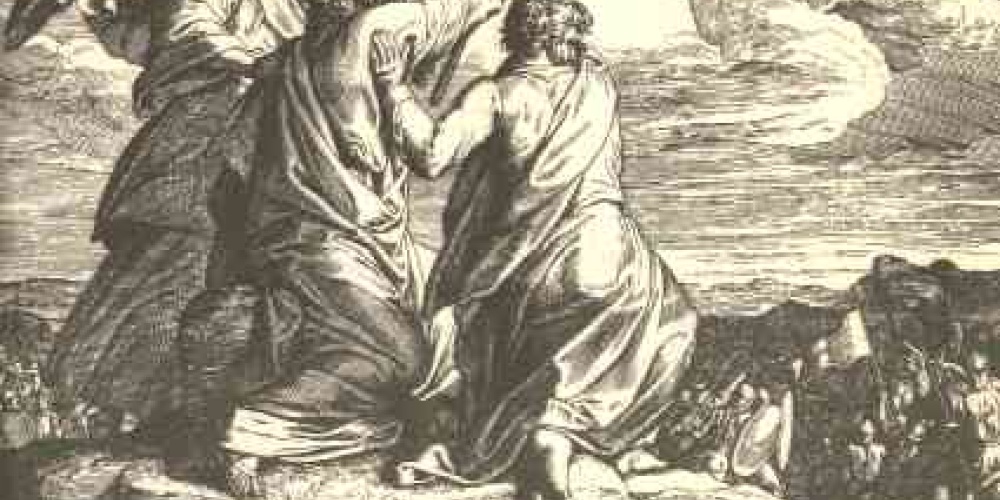
“Remember what Amalek did to you on the way when you left Egypt” (Devarim 25:17). Amalek is the embodiment of evil in this world, the inventor of terrorism, attacking the weak and defenseless from behind—for no reason other than pure hatred.
The story of Amalek appears twice in the Chumash. In Parshat Beshalach, it forms part of the narrative of the journey from Egypt to Sinai. The description is historical and factual, describing how Moshe appointed Yehoshua as Chief of Staff of the army and how that army defeated Amalek. “And Yehoshua weakened Amalek and his nation with the sword” (Shemot 17:13).
Forty years later, as Moshe recounts the events to a new generation, the memory of Amalek must motivate Jews to act. In Parshat Beshalach, it is G-d who “will surely erase the memory of Amalek” (v.14)—at that point in history, it would have been beyond the capability of the recently freed slaves to do so. Forty years later, it is the Jewish people who must erase their memory.
“Who cooled you on the way and…and you were weary and tired and [did] not fear G-d”. In biblical literature, fear of G-d is equated with morality, and the lack of such fear is the license for evil. “And Abraham said [to Avimelech], ‘That is what I said; that there is no fear of G-d in this place and they will kill me’” (Breisheet 20:11).
Yet left unclear is who it was, exactly, who did not fear G-d in that first passage. Should we link the lack of fear to the immediately preceding phrase, reading it as, “and you [the Jewish people] were weary and tired and did not fear G-d”? Or does it refer back to the beginning of the verse, speaking of Amalek who attacked the weary and weak because they did not fear G-d? This purposeful ambiguity is no accident. The Torah teaches that both Amalek and the Jewish people lacked fear of G-d. As there is little we can do to get the Amaleks of the world to fear G-d, we must at least ensure that we, ourselves, have the requisite fear of Him.
“And the entire congregation of Israel…encamped in Refidim, and there was no water for the people to drink…and that place was [also] called Masah and Merivah on the quarreling of the children of Israel and the testing of G-d, saying ‘Is G-d in our midst or not?’” (Shemot 17:1 and 7). Could it be that—after witnessing the makkot and the splitting of the sea, after hearing the voice of G-d at Sinai, after having their previous complaints over lack of water and food answered with oases and manna—the Jewish people could still question whether G-d is in their midst? Should we be surprised that the very next verse reads, “And Amalek came and fought with the Jewish people at Refidim”?
While the location of Amalek at Refidim is part of the chronological story of the Exodus, its placement at the end of Parshat Ki-Teze is carefully thought out. It follows on the heel of the prohibition, “Do not have in your pocket a stone [weight] and a stone, large and small; a perfect and honest stone you shall have” (25:14). Fear of G-d is primarily measured in those areas where one’s malfeasance is easily concealed from all but G-d, when we can easily keep our dishonest weight hidden “in our pocket” (see Rashi, Vayikra 19:14). The importance the Torah places on honesty in our business transactions is such that that we observe it “so that you will have length of days”, it being one of the very few mitzvoth which promises such a reward. The Torah concludes this mitzvah with the warning, “It is an abomination to the Lord your G-d, whoever does this, whoever acts corruptly”. It is not by chance that the Talmud (Shabbat 30a) claims that the first question G-d will ask us after our sojourn in this world is, “Were your business dealings conducted b’emunah?” B’emunah is generally translated as honesty. Emunah, however, means much more, and denotes our faith in G-d; such is measured by our honesty in the marketplace. Our Sages, quoted by Rashi, simply note, “If you cheat in your weights, be worried from the lion [Amalek]”.
The battle with (the external) Amalek in Parshat Beshalach was a relatively simple one—all we had to do was look up to heaven, and victory was ours. The battle with Amalek recorded in Ki-Teze—with the internal Amalek—is much more difficult.
The Torah follows this Amalek with the mitzvah of bikkurim, where the farmer must take his first fruit to Jerusalem and publicly proclaim that the land was given to us as part of our historical mission to be a holy nation. Amalek attacked baderech, on the way, as they tried to stop our historical journey. They would not succeed in thwarting the will of G-d. How sad that some amongst us try to do as much through their unethical business practices.
Amalek is the eternal enemy of the Jewish people. G-d can take care of the external Amalek, but only we can defeat the internal Amalek.
“Remember… do not forget”.



